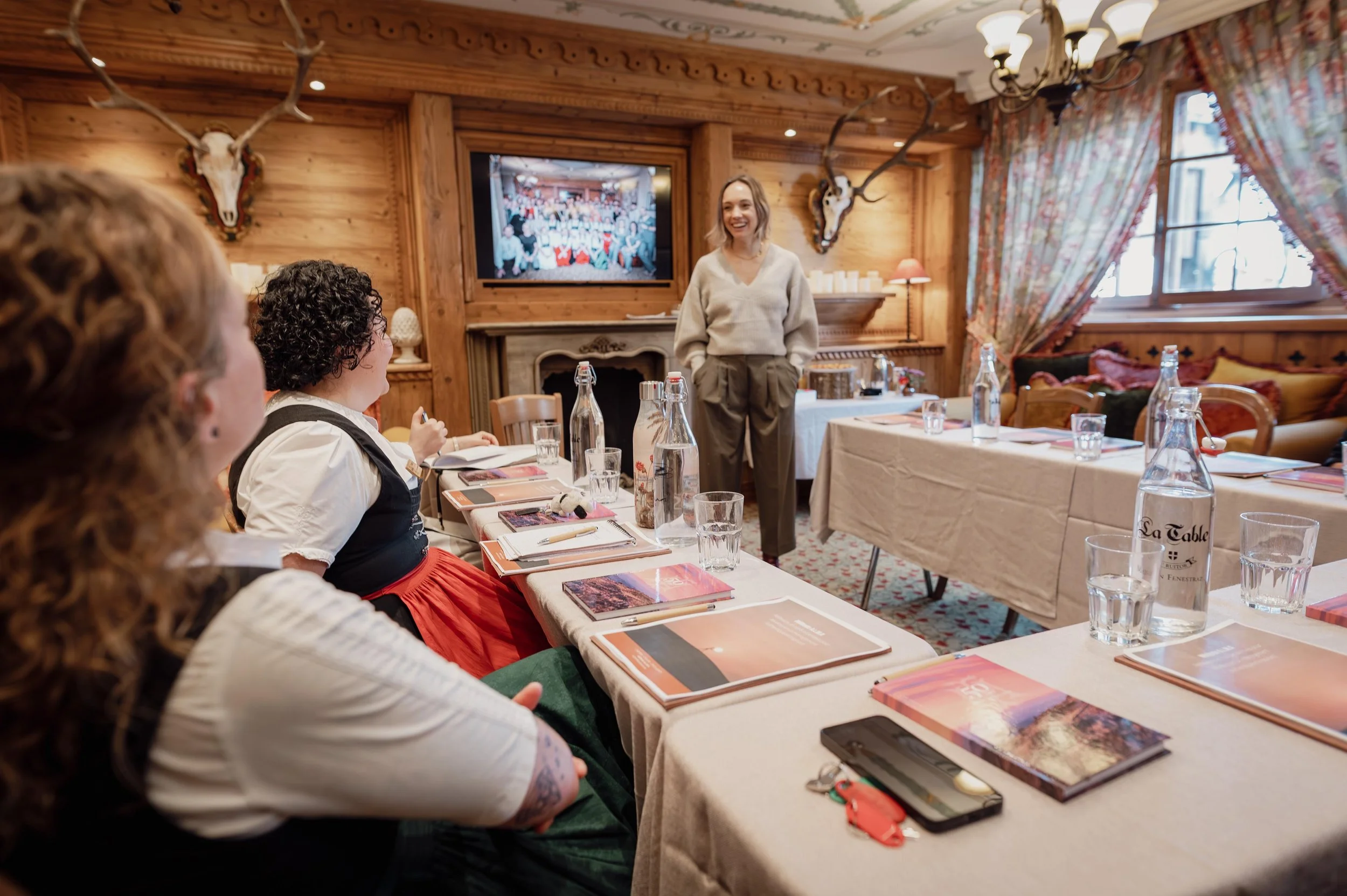
Hi, I’m Victoire,
thanks for being here!
Behind every brand, there’s a story and this is mine.
What passionates me
To create spaces where people, especially those who serve others, can reconnect to who they are, why they do what they do, and how they want to show up in the world.
Through the ALMA Framework, I help hospitality teams and leaders tap into their intrinsic motivation, align with their values, and foster a culture where authentic service, clarity, and excellence grow from the inside out.
Because I believe that:
When a person is aligned, the whole team rises.
When a team is alive, the guest experience becomes magic.
How I work
I’m based in Spain, but I travel a lot.
My work is rooted in presence, in real connection. I believe in shared energy, in the power of eye contact, of breath, of being physically together when we do meaningful work, from human to human.
Yes, I do online coaching. Yes, I follow up with teams virtually.
But I believe in action in the field, in person.
Because in a modern world where everything happens online, where AI outperforms humans and real eye contact becomes rare, I stand for presence.
Transformation doesn’t happen in theory. It happens in the room.
In the rhythm of service. In the pulse of a team choosing to grow together.
There is nothing that replaces the energy of shared space, the shift we feel when we look each other in the eyes, breathe the same air, and move through change together.
That… is priceless.
I work with ROI in mind - measuring real transformation.
Each ALMA journey begins and ends with targeted well-being and motivation questionnaires, so we can track the shift in team energy, engagement, and emotional alignment.
So if you’re not just looking for another training but for real, lasting change that touches hearts, shifts mindsets, and uplifts your team from the inside out, I’d love to walk this path with you.
Let’s begin the conversation.
Sincerely,
Victoire
I was born into hospitality, quite literally.
In France, my family has been in the hotel world for generations. I grew up surrounded by the art of hosting, the elegance of detail, and the invisible thread that weaves unforgettable guest experiences. But at nine years old, my story took a turn: we moved to Argentina, and my world expanded.
I spent my adolescence in the vastness of South America, where things were raw, alive, and full of contrast. After ten formative years there, I moved to England to study business administration and, during my summers, traveled the world. I interned in Chanel in New York, Estée Lauder and UBS in London, and Ferrari in Shanghai, learning the codes of luxury from inside the offices of beauty brands, hedge funds, and haute parfumerie.
And yet, with all this exposure, the question that kept calling was:
“What does it truly mean to serve?”
At 23, I was managing a hotel and leading a team of 50 people in the family business. For seven years, I immersed myself in operations, team dynamics, and the many seasons of hospitality. But something in me longed for more. Not more status, but more truth. I realised I had inherited a beautiful legacy but hadn’t yet created a life that fully felt like mine.
So, I stepped out of the known.
I became a mother. I paused. I unraveled. I studied. I listened.
And I slowly, patiently, came home to myself.
That return and the embodied messiness of a life well lived birthed a new mission.
-
Coaching is a forward-focused practice that helps individuals identify and achieve personal goals. It’s rooted in positive psychology and draws from various disciplines, including personal development, sociology, and leadership training. The practice gained popularity in the 1980s, growing out of the business coaching and sports psychology fields.
-
While both therapy and coaching aim to help individuals improve their lives, they serve different purposes. Therapy focuses on healing past traumas, emotional pain, and addressing mental health concerns. It is often centered on diagnosing and treating psychological conditions.
Coaching, on the other hand, is future-oriented. It focuses on where you are now and where you want to go. A coach helps you set and achieve goals, develop strategies for personal and professional growth, and overcome obstacles standing in the way of your success. Unlike therapy, coaching does not involve diagnosing mental health disorders. -
Mentoring typically involves a more experienced individual providing guidance and advice based on their expertise in a specific field. It’s more instructional in nature.
Counseling often delves into emotional or psychological challenges and is focused on healing and emotional support.
Coaching is different because it’s a collaborative process focused on helping you achieve your personal and professional goals. Rather than offering advice, life coaches ask powerful questions, challenge limiting beliefs, and help you create actionable steps to reach your objectives. -
Coaching provides several key benefits, including:
Clarity on what you want to achieve and the steps needed to get there.
Accountability to keep you focused and moving forward.
Personal growth, by challenging you to step outside your comfort zone and overcome limiting beliefs.
Better decision-making and problem-solving skills.
Increased confidence in your abilities to achieve your goals.
Balance by helping you prioritize what matters most to you.
-
During a coaching session, you can expect a supportive, non-judgmental space where the coach will ask insightful questions to help you clarify your goals and explore possible obstacles. You will work together to create an action plan, set achievable targets, and explore strategies to overcome challenges. Each session will typically end with a clear plan for the next steps you need to take. The goal is to empower you with the tools and mindset to move forward confidently.
-
The duration of the coaching process depends on your goals and personal journey. Some clients achieve their objectives within a few sessions, while others may engage in a longer-term process to address multiple aspects of their life. Typically, clients commit to coaching for a period of a few months to a year, depending on the depth of the work they want to achieve.
-
Neuro-Linguistic Programming (NLP) is a set of techniques that helps you understand and reshape how your mind interprets experiences, emotions, and behaviors. In my coaching, NLP is used to gain clarity on limiting beliefs, break recurring patterns, and develop healthier, balanced relationships. NLP can empower you to shift perspectives, communicate more effectively, and align with your true values, creating lasting change.
-
NLP techniques are particularly effective for addressing a range of relationship challenges, such as breaking toxic cycles, managing conflict, and improving self-awareness. NLP can also help in overcoming limiting beliefs, changing negative thought patterns, and gaining new perspectives on relationship dynamics, enabling you to build connections that are more authentic and aligned with your values.
-
Ideally, we’ll meet once every two weeks to allow time for reflection and practice between sessions. To make the most of our time together, you can come prepared with a specific issue or goal you want to explore. Having an area of focus ensures each session is as impactful as possible.
-
Yes, confidentiality is a core principle of my coaching practice. Everything we discuss in our sessions is strictly private, creating a safe and secure environment where you can share openly. Your trust and privacy are respected and protected.




